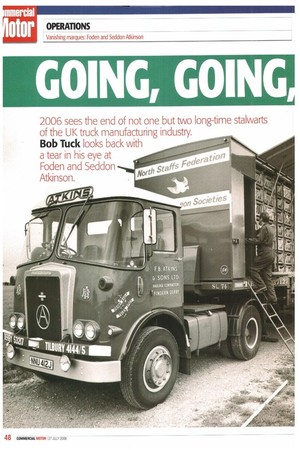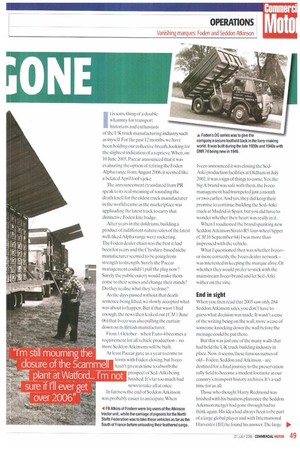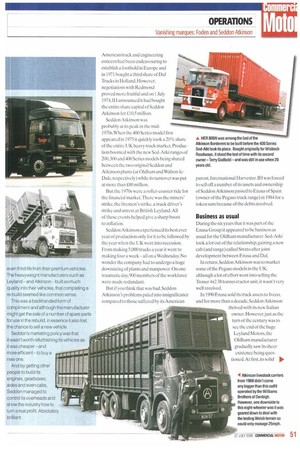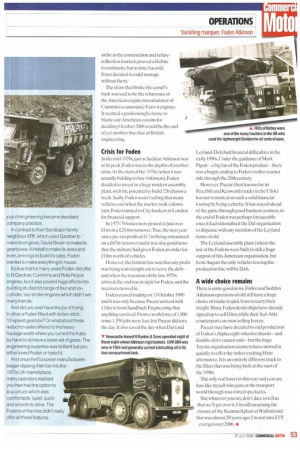Go NG, GO NG
Page 48

Page 49

Page 51

Page 53

If you've noticed an error in this article please click here to report it so we can fix it.
2006 sees the end of not one but two long-time stalwarts of the UK truck manufacturing industry.
Bob Tuck looks back with a tear in his eye at Foden and Seddon Atkinson.
It is something of a double whammy for transport historians and enthusiasts of the UK truck manufacturing industry such as myself. For the past 12 months. we have been holding our collective breath, looking for the slightest indication of a reprieve.When, on 10 June 2005, Paccar announced that it was evaluating the option of retiring the Foden Alpha range from August 2006, it seemed like a belated April fool's joke.
The announcement (translated from PR speak to its real meaning of sounding the death knell for the oldest truck manufacturer in the world) came as the marketplace was applauding the latest truck to carry that distinctive Foden kite badge.
After years in the doldrums, building a product of indifferent nature, sales of the latest well-liked Alpha range were rocketing. The Foden dealer chain was the best it had been for years and the Cheshire-based niche manufacturer seemed to be going from strength to strength. Surely the Paccar management couldn't pull the plug now? Surely the public outcry would make them come to their senses and change their minds? Do they realise what they've done?
As the days passed without that death sentence being lifted, we slowly accepted what was about to happen. But if that wasn't had enough, the news then leaked out (CM 1 June 06) that Iveco was also pulling the curtain down on its British manufacturer.
From 1 October—when Euro-4 becomes a. requirement for all vehicle production — no more Seddon Atkinsons will be built.
At least Paccar gave us a year to come to terms with Foden closing, but Iveco hasn't given us time to absorb the prospect of Sed-Atki being finished. It's far too much bad news to take all at once.
I'm not
In fairness, the end of Seddon Atkinson was probably easier to anticipate. When Iveco announced it was closing the SedAtki production facilities at Oldham in July 2002, it was a sign of things to come. Yes, the big A brand was safe with them, the Iveco management had trumpeted just a month or two earlier. And yes. they did keep their promise to continue building the Sed-Atki truck at Madrid in Spain, but you did have to wonder whether their heart was really in it.
When I roadtested the brand spanking new Seddon Atkinson Strato R5 four-wheel tipper (CM 16 September 04) I was more than impressed with the vehicle.
What I questioned then was whether Iveco — or more correctly, the [Yew dealer network — was interested in keeping the marque alive. Or whether they would prefer to stick with the mainstream Iveco brand and let Sed-Atki wither on the vine.
End in sight
When you then read that 2005 saw only 284 Seddon Atkinson sales, you don't have to guess what decision was made. It wasn't a ease of the writing being on the wall, more a case of someone knocking down the wall before the message could be put there.
But this was just one of the many walls that had held the UK truck building industry in place. Now, it seems, these famous names of old —Foden.Seddon and Atkinson — are destined for a final journey to the preservation rally field to become a modest footnote in our country's transport history archives. It's a sad time for us all.
Those who thought Harry Redmond was iinished with his business plan once the Seddon Atkinson merger had gone through had to think again. His idea had always been to be part of a large global player and with International Harvester (1H) he found his answer.The large American truck and engineering concern had been endeavouring to establish a foothold in Europe and in 1971 bought a third share of Daf Trucks in Holland. However, negotiations with Redmond proved more fruitful and on 1 July 1974,111 announced it had bought the entire share capital of Seddon Atkinson for 1:10.5 million.
Seddon Atkinson was probably at its peak in the mid1970s.When the 400 Series model first appeared in 1975 it quickly took a 20% share of the entire UK heavy truck market. Production boomed with the new Sed-Atki ranges of 200,3(X) and 400 Series models being shared between the two original Seddon and Atkinson plants (at Oldham and Walton-leDale, respectively) while its turnover was put at more thank:80 million.
But the 1970s were a roller-coaster ride for the financial market.There was the miners' strike, the firemen's strike, a truck driver's strike and unrest at British Leyland. All of these events helped give a sharp boost to inflation.
Seddon Atkinson experienced its best ever year of production only for it to be followed by the year when the UK went into recession. From making 5,000 trucks a year it went to making four a week — all on a Wednesday. No wonder the company had to undergo a huge downsizing of plants and manpower. On one traumatic day. 900 members of the workforce were made redundant.
But if you think that was bad, Seddon Atkinson's problems paled into insignificance compared to those suffered by its American parent, International Harvester. IH was forced to sell off a number of its assets and ownership of Seddon Atkinson passed to Enasa of Spain (owner of the Pegaso truck range) 411984 for a token sum because of the debts involved.
Business as usual
During the six years that it was part of the Enasa Group it appeared to be business as usual for the Oldham manufacturer. Sed-Atki took a lot out of the relationshipgaining a new cab (and range) called Straw after joint development between Enasa and Dal.
In return, Seddon Atkinson was to market some of the Pegaso models in the UK; although a lot of effort went into selling the Ironer 4x2 38 tonnes tractor unit, it wasn't very well received.
In 1990 Enasa sold its truck assets to lveco, and for more than a decade, Seddon Atkinson thrived with its new Italian owner. However,just as the turn of the century was to see the end of the huge Leyland Motors, the Oldham manufacturer gradually saw its sheer existence being questioned.At first, its solid PP.
niche in the construction and refusecollection markets proved a lifeline to continuity, but as time has told. Iveco decided it could manage without them.
The straw that broke the camel's back was said lobe the reluctance of the American engine manufacturer of Cummins to announce Euro-4 engines. It seemed a good enough excuse to blame our American cousins for deciding October 2006 would he the end of vet another fine slice of British engineering.
Crisis for Foden
In the mid-1970s, just as Seddon Atkinson was at its peak, Foden was in the depths of another crisis.At the start of the 1970s (when it was actually bidding to buy Atkinson), Foden decided to invest in a huge modern assembly plant, with the potential to build 120 chassis a week. Sadly. Foden wasn't selling that many vehicles and when the market took a downturn,Foden turned to City bankers in London for financial support.
In 1975-76 losses were posted at just over Limon a .E.28.6m turnover.True, the next year saw a pre-tax profit olf I 7m being announced on a £47m turnover and it was also good news that the military had given Foden an order for
Om worth of vehicles.
However, the bottom line was that any profit was being sent straight out to serve the debt— and when the recession of the late 1970s arrived. the end was in sight for Foden, and the receivers moved in.
Foden ceased trading on 13 October 1980 and it was only because Paccar arrived with £18m to form Sandbach Engineering that anything survived. From a workforce of 1,9(X) some 1,550 jobs were lost, but Paccar did save the day. It also saved the day when Dal. (and Leyland-Dal) had financial difficulties in the early I 990s. Under the guidance of Mark Pigott— a big fan of the Foden product — there was a happy ending to Fodens roller-coaster ride through the 20th century.
However, Paccar (best known for its Peterbilt and Kenworth trucks in the USA) has not remained on such a solid financial footing by being a charity. It has stayed ahead of the game through good business acumen, so the end of Foden was perhaps foreseeable once it had rationalised the Daf organisation to dispense with any mention of the Leyland name of old.
The Leyland assembly plant (where the last of the Fodens were built) is still a huge outpost of this American organisation, but from August the only vehicles leaving the production line will be Dafs.
A wide choice remains
There is some good news. Foden and Seddon Atkinson operators of old still have a huge choice of trucks to pick from to carry their freight. Many Foden dealerships have already signed up to sell Hino, while their Sed-Atki counterparts are now selling Ivecos.
Paccar may have decided to end production of Foden's Alpha eight-wheeler chassis— and double-drive tractor unit — but the huge Toyota organisation seems to have moved in quickly to offer the rather exciting Hino alternative. It is an entirely different truck to the Hino that was being built at the start of the 1990s.
The only real losers in this very sad year are fans like myself who gaze at the transport world through rose-tinted spectacles.
But whatever you say, don't dare to tell us that we'll get over it. I'm still mourning the closure of the Scammell plant at Watford and that was almost 20 years ago. I'm not sure if I'll
ever get over 2006. •
























































































































































































